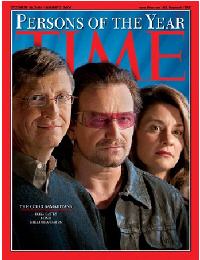Gates won't cross China government


While at the World Economic Forum in Davos, Gates argued that state censorship shouldn't stop technology companies from doing business in China. In essense, he was defending Google's concessions in censoring its China site, as well as Microsoft's and Yahoo's. "I think (the Internet) is contributing to Chinese political engagement. ... Access to the outside world is preventing more censorship," Gates said as reported by the AP. In other words, some is better than none. And, you can be sure that Gates is walking a fine political line with China--trying to get the Chinese to pay for his products and reduce the piracy. Taking a stand against censorship, telling the Chinese authorities how to run their country won't sell.
Gates also said that China is reducing poverty, which could lead to many more of the 1.3 billion Chinese citizens joining the 64 million already participating in the broadband Internet revolution. Those Chinese citizens joining the broadband revolution, won't be getting the unvarnished Internet--just the portion allowed by the government. Given that filtering out what the Chinese authorities don't want isn't an exact science and that you can't keep a billion people from circumventing the system, the censorship efforts will ultimately fail. By design the Internet is porous.
It's crystal clear that Microsoft and other tech companies aren't about to forego economic opportunity in China or other countries that censor the Internet. The philosophy is that some censorship of the Internet is better than not having it at all. In the meantime, Yahoo provided personal information leading to the incarceration of a journalist and the big three have firewalled sites that the Chinese government finds that may "harm the dignity and interests of the state" or that foster "evil cults" or "damage the social stability."
My colleague Mitch Ratcliffe writes:
...abetting a tyranny is always wrong, no matter how you dress it. Bill Gates can say this today, but he isn't doing any favors for the people in China who will suffer today because of the censorship he condones.
A teenage Chinese girl seeking information about birth control won't find the National Campaign to Prevent Teen Pregnance site on Google (though she will find it on Yahoo! and MSN), but she may get a cure to tuberculosis in exchange. That's a calculus of justice that Gates isn't entitled to judge, because those decisions should be up to the individual, not the companies purporting to offer her access to the world's knowledge.
I wrote about how the moral ground is shifting for the "do not evil" Google. Nick Carr captures the big picture in this post:
...The internet is being subsumed into the real world.
Brin's belief that the internet might exist in a separate uncompromised space, where all the world's information is always available, unfiltered, to everyone, is not just a personal ideal; it's one of the internet's foundational ideals. And it's a good ideal: it puts a stake in the ground. But it's clear now that the future of the internet is going to be determined by how wisely we compromise that ideal, not by how fiercely we hold onto it.